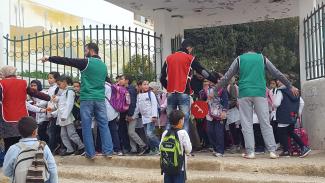June 2017—For children living in neighborhoods in the north of Morocco, walking to school is filled with peril. Cars whizzing through school zones at high speeds make the simple act of crossing the street a dangerous feat.
Fed up with their kids risking injury to get to school, a small group of fathers in the Jemaa Mezouak neighborhood decided to take matters into their own hands earlier this spring. Equipped with community organizing skills from their participation in a security program funded by USAID, these dads banded together to form the Brigade Scolaire (School Brigade) to enforce traffic safety around neighborhood school zones by volunteering as crossing guards.
While the neighborhood parents were happy to see this new safety initiative, in the beginning, the brigade had difficulty finding other adults willing to dedicate their time to help children cross busy streets.
“We wanted to create order among parents and students and give a better image of our neighborhood,” said Najlae Ahmamouch, a neighborhood parent volunteer.
The lack of support from other parents didn’t deter the brigade’s mission. Together with the school administration and the president of the school parent-teacher association, the small but mighty team of dads divided up tasks: One father, a carpenter, offered to make stop signs in his workshop, allowing the dads to use bright red signs when they reported for duty at the crosswalks. Another father borrowed vests sponsored by soccer teams so the dads would be identifiable to students, other parents, and passing motorists.
Even the local police were inspired to get involved. After attending a presentation of the brigade’s crosswalk initiative organized by USAID, the district chief, who is also the father of a student attending the neighborhood school, committed police support to the initiative by developing a proposal to install new street signs in school zones to alert motorists to school crossings.
Slowly but surely parents began to volunteer with the dads’ brigade. Seeing the success of this initiative, parents with students at nearby schools wanted the program to be implemented more broadly. To date, enough volunteers have been recruited to establish a fixed work schedule for volunteer crossing guards at two neighborhood schools.
USAID’s Community Oriented Policing Activity, which runs from 2015 to 2018, works to build mutual trust between citizens, local police and community leaders in the north of Morocco, emphasizing dialogue between the community and police on security and safety issues. The project, which works in four communities in Tangier and Tetouan, has reached nearly 7,000 people.
Previously, safety and security issues were not openly discussed, but now residents feel comfortable raising their concerns in an open forum with local police. Despite lacking a formal education or not finishing high school, residents have gained new skills through the project and are playing a crucial role with local police to help improve security in their communities. At least half of those trained through the project are women and a majority are under 35 years old.
LINKS
Follow @usaidmorocco, on Facebook, on Flickr, on YouTube

Primary TextWe wanted to create order among parents and students and give a better image of our neighborhood.”

